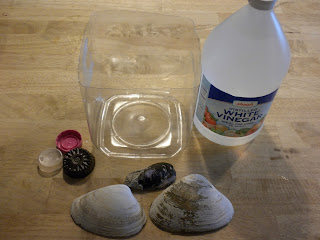 |
| Kennebunk Beach, Maine |
Sand & wave help wear shells down, sure. But the most important agent of recycling is carbonic acid. Surprisingly, all rain is mildly acidic. As raindrops pass through the air, they smack into CO2 molecules and create a very weak carbonic acid.
Seashells are made up of calcium carbonate, an alkali. When an acid and an alkali get together, they react. A rained-on seashell slowly disintegrates. In months or years, that shell will completely dissolve away, releasing the building blocks for new organisms. It's been the way of the world for at least 570 million years.
So what?
Simple. Most shelled creatures need an alkaline world, acid kills them. You've heard of the pH scale: 0 to 14, 0 is most acidic, 14 is most alkaline, 7 is neutral. Historically, the ocean's average pH was 8.179. Today, it's 8.069. Doesn't sound like a big change. But that's a 28.8% increase in the concentration of hydrogen ions (the things that make an acid acidic), in just 250 years. It's all because there's more CO2 in the air. Acidic rain, combined with mixing of air & surface ocean water, is driving down the pH of the oceans. Antarctic ice cores show that CO2 levels are higher now than they've been in at least 800,000 years.
Shelled sea organisms make their shells by creating calcium carbonate. Acids attack and destroy calcium carbonate. As the pH of the ocean sinks, shelled creatures will have a harder & harder time creating and keeping the shells they need to survive. It's happened before. It's happening now. Good luck finding a wild oyster in the waters off the NW U.S. They haven't bred for 6 years now, thanks to a local pH of about 7.7. That's right. An ancient animal -- and major food source -- can no longer survive in its ancestral waters.
This isn't some "Children of Men" dystopian future. This is now.
With all this in mind, a couple weeks ago I started a little experiment to show just what happens to a seashell in an acidic world. For fun, I decided also to show what happens to plastics in an acidic world.
 |
| 2 surf clams, 1 blue mussel, 1 #4 plastic, 1 #5 plastic, 1 #6 plastic |
It was eye opening.
 |
| Recycling |
No comments:
Post a Comment